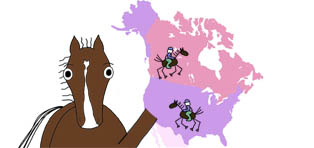Thehorse.com
by: Edited Press Release
September 02 2010, Article # 16899
New York State Agriculture Commissioner Patrick Hooker announced the state's first confirmed equine case of Eastern Equine Encephalitis (EEE) this year on Aug. 27. The affected horse was a 2-year old gelding kept in Oswego County. EEE is a rare viral disease of horses and humans that is spread by infected mosquitoes. To date, there have been no reported nor confirmed human cases of EEE in 2010.
"New York's abundant water sources and humid climate unfortunately make the perfect breeding ground for mosquitoes and the EEE virus," Commissioner Hooker said. "Therefore, we highly encourage horse owners to protect their animals and consider vaccinating for EEE. The EEE vaccine has proven to drastically reduce the incidence of the virus in horses and can be easily administered by a private veterinarian."
The infected horse was purchased at a New York auction earlier this year. The young horse had an unknown vaccination history at the time of purchase and was not vaccinated after purchase. Last week, the gelding was showing typical signs of EEE, including loss of appetite, circling and leaning against the stall, and after examination by a private veterinarian, was euthanized. Brain samples were sent to the New York State Department of Health's Wadsworth Laboratory and tested positive for EEE. To date, the other horses on the same premises are not showing any signs of EEE and have since been vaccinated.
EEE is found mainly along the East Coast, affects the central nervous system of horses, and usually results in death in horses. Symptoms in equines include staggering, circling, depression, loss of appetite and sometimes fever and blindness. Humans cannot become infected by handling an infected horse, nor can a horse acquire the virus from another infected horse; however, the presence of an infected horse in the area indicates that mosquitoes carrying EEE are present and infected mosquitoes pose a threat to both humans and horses.
While there is no treatment, nor cure for this disease, vaccines are available and found to be effective in protecting horses from this virus. The vaccines are effective for six to twelve months, so horses should be vaccinated at least annually. In an area where the disease occurs frequently, such as Oswego County, most veterinarians recommend vaccination every six months. For the vaccine to be effective it must be handled and administered properly and be given at least two weeks before the horse is exposed to the virus.
Other methods of preventing EEE in horses and humans is to control mosquito populations, which can be done by destroying standing water, using insect repellents and removing animals from mosquito-infested areas during peak biting times, usually dusk to dawn. Horse owners and caretakers are also advised to wear light colored clothing, long sleeves and pants when tending horse in areas where mosquitoes may be present.

No comments:
Post a Comment